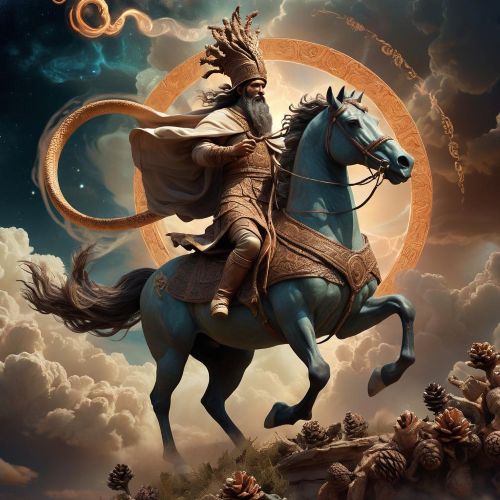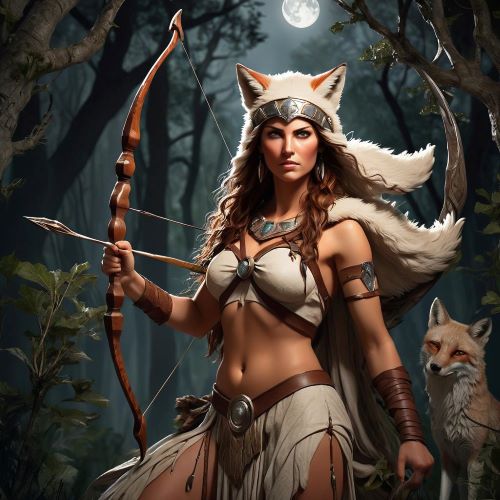Thracian Gods
The Thracian Gods are fascinating figures from the mythology of the ancient Thracians, a people who lived in parts of modern-day Bulgaria, Greece, and Turkey. These gods embody the raw forces of nature, the fierce spirit of warriors, and the mysteries of life and death. Unlike the more systematized pantheons of Greece or Rome, the Thracian Gods often appear through fragmented myths and local traditions, giving them a powerful, enigmatic quality. They were deeply tied to the natural world, worshipped in forests, mountains, and rivers, where their presence was most strongly felt.
Among the most significant Thracian Gods are figures like Sabazios, the sky and horseman god, often associated with thunder and fertility, and Bendis, a revered goddess of the moon, forests, and the hunt. Zalmoxis, a mysterious god connected to immortality and the afterlife, was central to Thracian religious belief, influencing even later Greek philosophical ideas. These gods were not distant beings but living forces who walked among their people, shaping their destinies and demanding both reverence and respect. Rituals honoring the Thracian Gods often involved music, dance, and sacred feasts that celebrated the cycle of life and nature.
The worship of Thracian Gods was deeply intertwined with the warrior culture of the Thracians. Courage, strength, and loyalty were seen as divine qualities bestowed by the gods. Heroes who displayed exceptional bravery were often believed to be favored or even descended from these deities. Sacred objects, such as weapons, horse gear, and votive offerings, were commonly dedicated to the gods to gain favor in battle or protection for the tribe. Many archaeological sites reveal the importance of these rituals, with shrines and artifacts pointing to a vibrant and deeply spiritual religious life.
Today, the legacy of the Thracian Gods lives on in the folklore, traditions, and cultural memory of the regions once inhabited by the Thracians. Traces of their worship can be seen in the symbols and myths that survived through Roman times and even influenced early medieval beliefs. Festivals that celebrate the natural world, the changing seasons, and the mysteries of life still echo the ancient reverence for the divine forces once embodied by the Thracian pantheon. Scholars and historians continue to uncover new insights into these ancient deities, piecing together a picture of a rich and complex spiritual tradition.
Exploring the world of the Thracian Gods offers a glimpse into a vibrant, ancient culture that celebrated the power of nature, the strength of the warrior spirit, and the mysteries beyond the mortal world. Their gods were raw, dynamic, and deeply rooted in the natural environment, reflecting the Thracians’ profound respect for the forces that shaped their lives. Though much of their mythology remains a tantalizing mystery, the Thracian Gods continue to inspire fascination and awe, reminding us of a time when the divine was an ever-present force in the world around us.
The Thracian Gods are fascinating figures from the mythology of the ancient Thracians, a people who lived in parts of modern-day Bulgaria, Greece, and Turkey. These gods embody the raw forces of nature, the fierce spirit of warriors, and the mysteries of life and death. Unlike the more systematized pantheons of Greece or Rome, the Thracian Gods often appear through fragmented myths and local traditions, giving them a powerful, enigmatic quality. They were deeply tied to the natural world, worshipped in forests, mountains, and rivers, where their presence was most strongly felt.
Among the most significant Thracian Gods are figures like Sabazios, the sky and horseman god, often associated with thunder and fertility, and Bendis, a revered goddess of the moon, forests, and the hunt. Zalmoxis, a mysterious god connected to immortality and the afterlife, was central to Thracian religious belief, influencing even later Greek philosophical ideas. These gods were not distant beings but living forces who walked among their people, shaping their destinies and demanding both reverence and respect. Rituals honoring the Thracian Gods often involved music, dance, and sacred feasts that celebrated the cycle of life and nature.
The worship of Thracian Gods was deeply intertwined with the warrior culture of the Thracians. Courage, strength, and loyalty were seen as divine qualities bestowed by the gods. Heroes who displayed exceptional bravery were often believed to be favored or even descended from these deities. Sacred objects, such as weapons, horse gear, and votive offerings, were commonly dedicated to the gods to gain favor in battle or protection for the tribe. Many archaeological sites reveal the importance of these rituals, with shrines and artifacts pointing to a vibrant and deeply spiritual religious life.
Today, the legacy of the Thracian Gods lives on in the folklore, traditions, and cultural memory of the regions once inhabited by the Thracians. Traces of their worship can be seen in the symbols and myths that survived through Roman times and even influenced early medieval beliefs. Festivals that celebrate the natural world, the changing seasons, and the mysteries of life still echo the ancient reverence for the divine forces once embodied by the Thracian pantheon. Scholars and historians continue to uncover new insights into these ancient deities, piecing together a picture of a rich and complex spiritual tradition.
Exploring the world of the Thracian Gods offers a glimpse into a vibrant, ancient culture that celebrated the power of nature, the strength of the warrior spirit, and the mysteries beyond the mortal world. Their gods were raw, dynamic, and deeply rooted in the natural environment, reflecting the Thracians’ profound respect for the forces that shaped their lives. Though much of their mythology remains a tantalizing mystery, the Thracian Gods continue to inspire fascination and awe, reminding us of a time when the divine was an ever-present force in the world around us.



